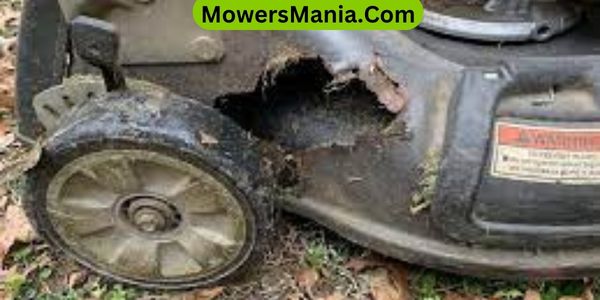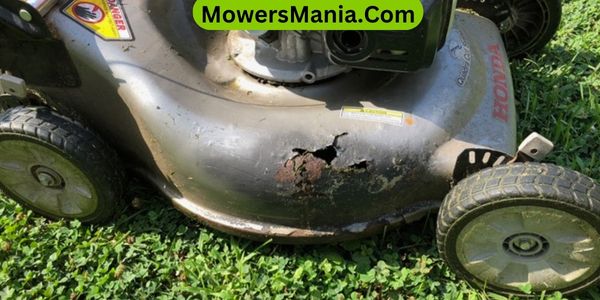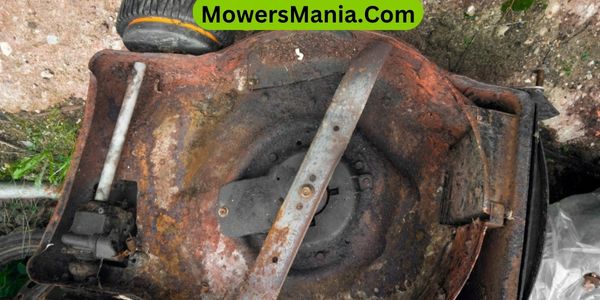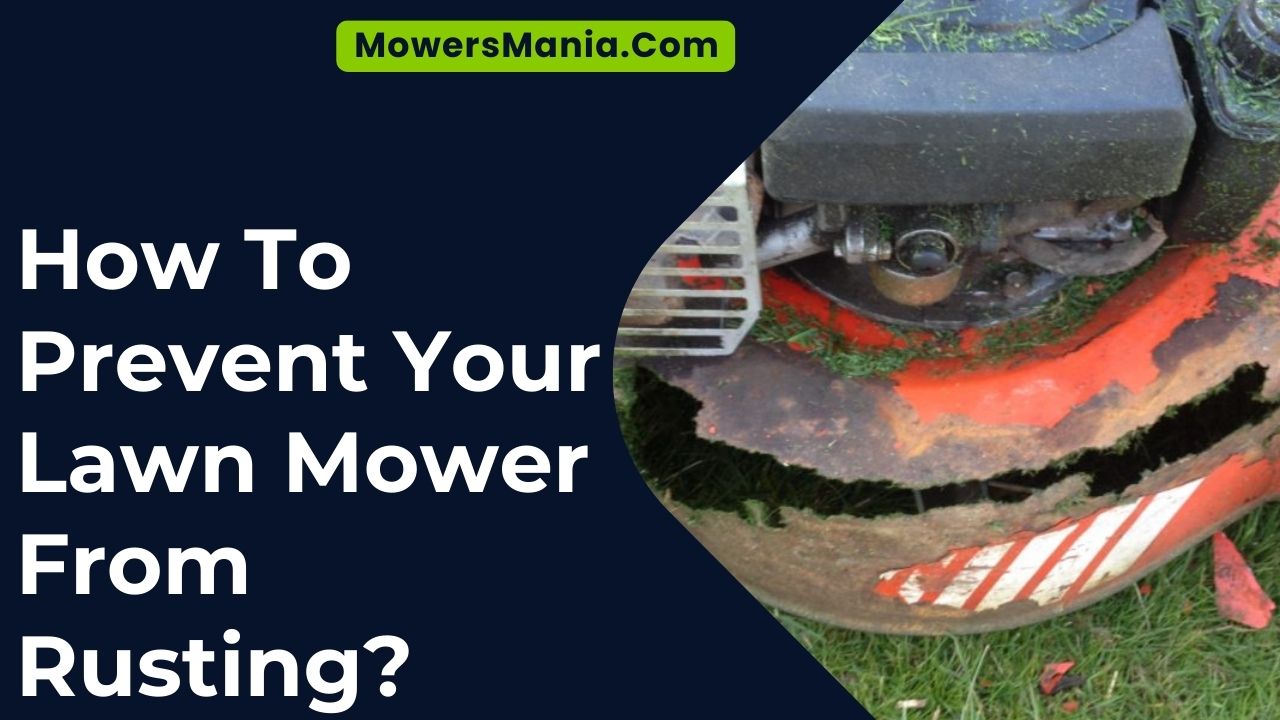Is your lawn mower like a faithful steed, tirelessly churning through the grass to keep your yard looking pristine? To keep it in top shape, preventing rust is crucial.
Rust can eat away at your mower, shortening its lifespan and making it less effective. By taking a few simple steps, you can keep rust at bay and ensure your mower stays in tip-top condition.

In this guide, we’ll show you how to prevent your lawn mower from rusting so you can keep it running smoothly and looking great for years to come.
Understanding the Causes of Rust
To prevent rust on your lawn mower, it’s important to understand the causes of this corrosion. Rust on your mower is often caused by exposure to moisture and oxygen, which leads to the formation of iron oxide on the metal surfaces.
This can occur when the mower is left outside in the rain or high humidity for extended periods. Additionally, moisture can accumulate underneath the mower deck, especially if it’s not cleaned and dried properly after each use.
Another common cause of rust is the build-up of grass clippings and debris on the mower, which trap moisture and create the perfect environment for rust to develop.
Furthermore, using your lawn mower in wet grass or leaving it with damp grass clippings on the underside can also contribute to rust formation.
The combination of moisture and grass clippings can accelerate the corrosion process. Additionally, scratches or nicks in the mower’s paint or protective coating can expose the metal to moisture, leading to rust.
Understanding these causes of rust is crucial in taking preventive measures to protect your lawn mower from corrosion. Regular maintenance, proper cleaning, and storing your mower in a dry place can all help prevent rust and prolong the life of your equipment.
Cleaning and Drying Techniques
You can prevent rust on your lawn mower by thoroughly cleaning and drying it after each use. Start by disconnecting the spark plug to ensure safety.
Use a brush or putty knife to remove grass and debris from the undercarriage, blades, and around the engine. A pressure washer can also be effective but be cautious around electrical components.
Once clean, use a towel or air compressor to dry the mower completely. Pay special attention to areas that tend to hold moisture, such as the undercarriage and around the engine. After drying, apply a light coat of oil to metal surfaces to provide an extra layer of protection.
Store your mower in a dry place, preferably indoors or under a cover to shield it from the elements. By consistently following these cleaning and drying techniques, you’ll significantly reduce the risk of rust and extend the life of your lawn mower.
Protective Coating Application

After thoroughly cleaning and drying your lawn mower to remove any debris and moisture, the next step is to apply a protective coating to metal surfaces to further prevent rusting.
Here’s how you can effectively apply a protective coating:
- Choose the Right Coating: Select a high-quality rust-preventive spray paint or metal protectant specifically designed for outdoor equipment. Look for products with corrosion-resistant properties to provide long-lasting protection.
- Consider Rust Inhibitor Sprays: Some rust inhibitor sprays offer an additional layer of protection against moisture and oxidation. These products penetrate and displace existing moisture while providing a protective barrier against future corrosion.
- Even Application: Ensure that you apply the protective coating evenly and thoroughly over all metal surfaces of the lawn mower. Pay special attention to areas prone to moisture accumulation, such as the undercarriage and around the engine. Multiple thin coats are often more effective than a single thick coat, so be patient and allow each coat to dry before applying the next.
Proper Storage Practices
Proper storage of your lawn mower is essential for preventing rust. When not in use, always store your mower in a clean, dry place such as a shed or garage. If you must leave it outside, invest in a durable, weatherproof cover to shield it from moisture.
Before storing, make sure to clean the mower thoroughly to remove any grass clippings, dirt, or debris. Use a brush or cloth to wipe down the exterior and remove any moisture to prevent rust formation.
Additionally, it’s important to empty the fuel tank before long-term storage to avoid fuel degradation and potential damage to the engine. Keep the mower blade sharp and consider applying a light coating of oil to prevent corrosion.
Lastly, periodically check on your stored mower to ensure that it remains clean and dry. By following these proper storage practices, you can effectively prevent rust and prolong the life of your lawn mower.
Routine Maintenance Tips

Wondering how often you should perform routine maintenance on your lawn mower to prevent rust and ensure optimal performance?
Regular maintenance is crucial to keep your lawn mower in top condition and prevent rust from developing.
Here are some routine maintenance tips to help you maintain your lawn mower:
- Check and Change the Oil
Regularly check the oil level and quality. Change the oil according to the manufacturer’s recommendations or after a certain number of mowing hours.
- Clean the Deck and Blades
After each use, remove grass clippings, dirt, and debris from the deck and blades. Use a brush or compressed air to clean hard-to-reach areas.
By adhering to these routine maintenance tips, you can significantly reduce the risk of rust and prolong the life of your lawn mower.
Remember that prevention is key when it comes to rust, so make sure to prioritize these maintenance tasks to keep your lawn mower running smoothly.
Frequently Asked Questions [FAqs]
Can Using a Lawn Mower Cover Help Prevent Rust?
Using a lawn mower cover can help prevent rust by shielding the mower from moisture and exposure to the elements. It’s a simple and effective way to protect your equipment and extend its lifespan.
Are There Any Specific Types of Grass or Lawn Conditions That Can Contribute to Rust on a Lawn Mower?
In certain conditions, like wet grass and high humidity, rust can form on your lawn mower. To prevent it, make sure to thoroughly dry your mower after use and store it in a dry place.
What Should I Do if I Notice Rust on My Lawn Mower Blades?
If you notice rust on your lawn mower blades, stop using it immediately to prevent further damage. Use a wire brush to remove the rust, then apply a rust-inhibiting spray or lubricant to protect the blades. Regularly inspect and maintain them to prevent future rust.
Can Using a Rust-Resistant Fuel Additive Help Prevent Rust on a Lawn Mower?
Using a rust-resistant fuel additive can help prevent rust on a lawn mower. It creates a protective barrier that repels moisture and prevents corrosion. Regular use of the additive can help extend the life of your mower.
Are There Any Specific Cleaning Products or Techniques That Should Be Avoided to Prevent Rust on a Lawn Mower?
Avoid using harsh chemicals or abrasive cleaning tools, as they can damage the protective coatings on your lawn mower. Instead, opt for mild soapy water and a soft brush to clean and prevent rust.
Conclusion
By understanding the causes of rust, cleaning and drying your lawn mower properly, applying a protective coating, practicing proper storage, and maintaining routine maintenance, you can prevent your lawn mower from rusting.
Taking these steps will ensure that your lawn mower stays in top condition and lasts for years to come.
Keep your lawn mower rust-free and ready for action with these simple prevention tips.



